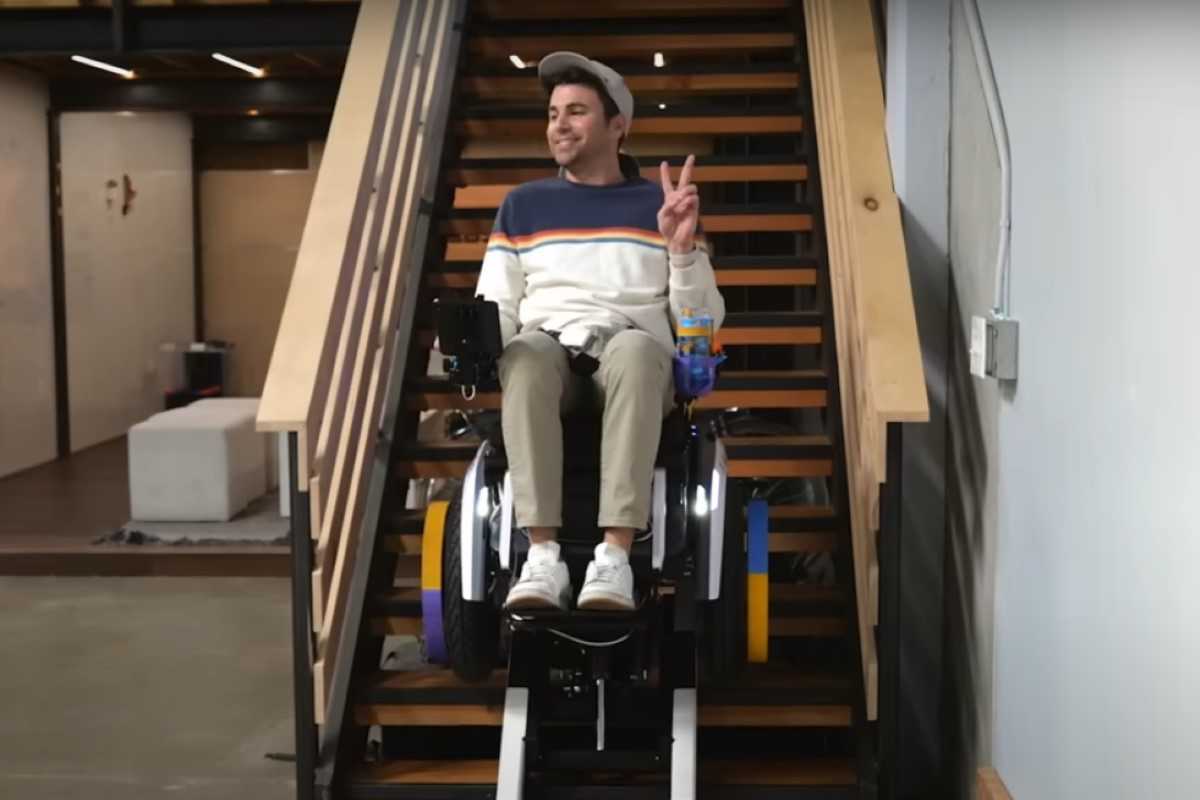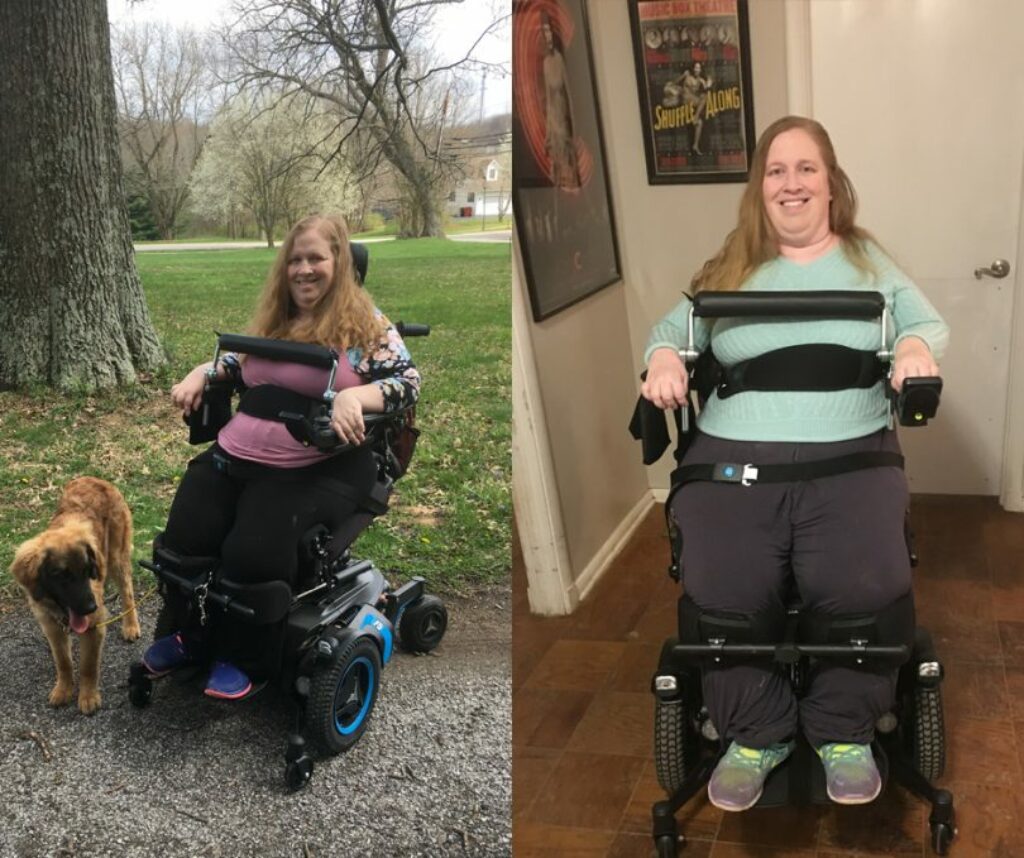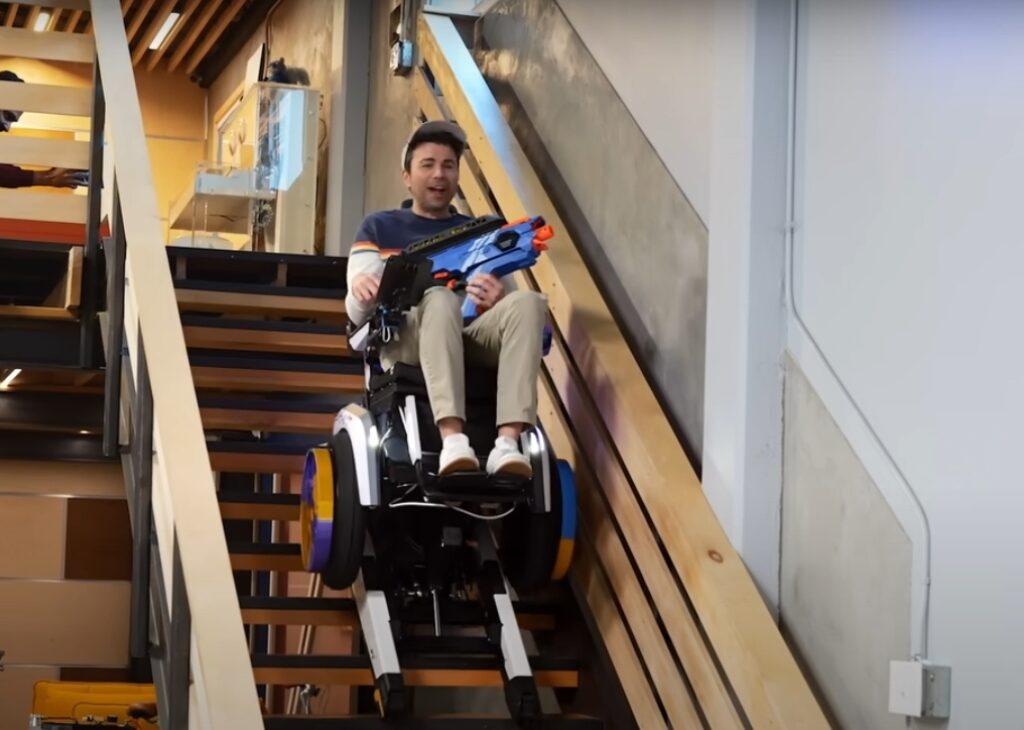
You may know NASA engineer turned STEM educator Mark Rober from his popular video series in which he exacts hilarious revenge on porch pirates with high-tech glitter bombs. Now, in his latest viral video, he's modifying a stair-climbing power wheelchair for a little boy with spina bifida named Cash. It’s been viewed over 5 million times as I write this. Get ready to see it in all your social media feeds, if it’s not there already.
The comments on the video are what we people with disabilities have come to expect from the general public when it comes to this sort of content. “Cash is so inspirational!” “What a cool wheelchair!” Yes, the wheelchair is amazing, and Cash is adorable and hilarious. But Mark Rober's video, however well-intentioned, perpetuates many false assumptions about mobility equipment and accessibility. As a power wheelchair user, I'm tired of able-bodied people using our technology for views and clout without addressing the barriers we face to actually getting it. So please, watch the video, and then read on for the reality.

Like Cash, I’ve been disabled since birth. I have cerebral palsy, and I have limited strength in my hands and arms, so I started using a power wheelchair as a teenager. I now have one of the most advanced power wheelchairs on the market, a Permobil F5 VS. It has a seat elevator, tilt and recline functions, and most notably, standing. Yes, I can stand in my wheelchair, and yes, it’s awesome.
I love my wheelchair, but I had to go through a lot to get it. I had to deal with multiple insurance companies, all of which denied the standing function, claiming it’s not medically necessary. How absurd is that?! But it’s par for the course when you have a disability — and therein lies the problem.

Every day, tens of thousands of disabled people in the United States go without the mobility equipment they need because they don’t have insurance or their insurance refuses to pay. The system is horribly broken and the smallest mistake can trip people up and leave them without mobility. For example, if you tell your insurance that you only need to use a wheelchair outside your home, they won’t cover it. They don’t care whether you can get to medical appointments, go grocery shopping, or spend time with your family. And forget functions like standing, stair climbing, or off-road capabilities. None of that is “medically necessary” under the American healthcare system.
I meet people in dire need of wheelchairs daily in my role as co-president of Mobility Aids Lending Library (MALL), a small Indiana-based nonprofit that refurbishes donated medical equipment and gives it to people in need free of charge. I'm sure most of our clients would love a stair-climbing wheelchair — who wouldn't? — but here in the real world, most people need a lightweight, folding manual or power wheelchair that can fit in the trunk of their car. Because guess what else isn't covered by insurance? That $50,000 van with a ramp or lift you'll need to transport a 300 lb. full-size power wheelchair.
It doesn't have to be this way. In many other countries, fully-featured power wheelchairs are widely available. Scewo, which makes the stair-climbing wheelchair Mark Rober used as a platform for his modifications, is based in Switzerland. Permobil, the maker of my standing wheelchair and other advanced wheelchairs, is based in Sweden. It's not a coincidence that these high-tech power chairs are designed in Europe. See, if you live in Sweden or Switzerland, and you need a wheelchair that stands or can go up and down stairs, you can get one — because both of those countries have universal healthcare.
Every time a video of some fancy wheelchair goes viral, I wonder how many Americans who hit the share button routinely vote against the people and policies that would make that technology affordable to those who need it. How many people in Cash's home state of Texas will comment on how cute he is while doing nothing to change the fact that 158,000 people are on their state's waiting list for disability services? How many know that he'll be facing a fight every 5 years for the rest of his life to get insurance to pay for an ultralight manual wheelchair he can push without destroying his shoulders by the time he's 40? Oh, and the specialized wheelchair basketball chair he'll need to become the next Stephen Curry? Not covered by insurance.
Mark Rober made some awesome modifications to the Scewo wheelchair, and I’d love to have many of them, especially the disco ball and the horn! Non-disabled people have no idea how often wheelchair users have to deal with pedestrians who just won’t get out of the way. But watching an able-bodied multi-millionaire celebrity use a stair-climbing wheelchair as an inspirational prop without acknowledging that most disabled Americans will never be able to get one is like a slap to the face. The Scewo BRO isn't even for sale in the United States yet, and it almost certainly won't be covered by insurance. At $46,000, it will only be affordable to the ultra-rich.
If Mark really wanted to do engineering for good in the disability space, he would collaborate with a disabled engineer, or one of the disabled people who repair and hack wheelchairs on YouTube, Together, they could create an affordable wheelchair built with parts you can find at any hardware store or bicycle shop, or investigate how power wheelchairs work and why they cost so much. Of course, there’s nothing wrong with including a child, especially since he runs education programs for kids. However, it’s glaringly obvious that no disabled adults were consulted about the design or depiction of the project, as it's a classic example of “inspiration porn” — the use of people with disabilities as props to make non-disabled people feel good.

I wish someone would make a viral video about the people I encounter regularly through MALL and my other disability advocacy work. People like the sweet elderly lady whose new basic power wheelchair broke after a week, and she’s been waiting two months for the shady medical equipment company to fix or replace it. People like the vibrant artist who was stuck in bed for literally years while waiting to get a power chair with seating that could properly support her body. MALL gave the elderly lady a working wheelchair, and my friend finally got the chair she needed, but both of them suffered for far too long and it’s completely unacceptable. These stories are common and it often feels like nobody cares about them.
I don’t begrudge Cash any of this attention; he's a great kid who deserves to be in the spotlight. I'm also glad Mark Rober is drawing attention to mobility aids. I hope the engineering community will reach out to the disability community to learn more about innovations that could benefit us. But before you share his video, think about what you can do that's actually helpful. Vote for politicians who support universal healthcare. Make your home and business accessible. Volunteer or donate money to MALL or an organization like it in your community. And please, don't use technology meant for people with disabilities to make yourself look good without taking meaningful action to make that technology available and affordable.
Together, we can ensure everyone has access to the mobility equipment they need. And a built-in train horn. Get out of the way, I have places to go.
Founder and Editor-in-Chief of The Ability Toolbox. I received my BA in English from Stanford University and MA in Clinical Psychology from Antioch University Los Angeles, and have worked in entertainment and health media for over 20 years. I also blog about traveling with a disability. As a wheelchair user with cerebral palsy, I am deeply committed to amplifying the voices of the disability community through writing and advocacy.








Start the discussion at community.theabilitytoolbox.com